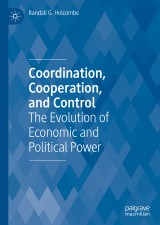Details

Coordination, Cooperation, and Control
The Evolution of Economic and Political Power|
96,29 € |
|
| Verlag: | Palgrave Macmillan |
| Format: | |
| Veröffentl.: | 23.07.2020 |
| ISBN/EAN: | 9783030486679 |
| Sprache: | englisch |
Dieses eBook enthält ein Wasserzeichen.
Beschreibungen
There are two ways people coordinate their actions: through cooperation, exercised by economic power, and through control, exercised by political power. When economic and political power are held by the same people, the result is stagnation; when those who hold economic power are not the same people who hold political power, the result is progress. This book presents the ways in which economic power and political power can be separated, and how they can remain so, by analyzing the nature of power and the differences between economic and political power. The book then discusses the history of economic and political power, including hunter-gatherer societies, agrarian societies, and modern commercial and industrial societies. This background lends insight into why political and economic power were typically held by the same people, and why recently those without political power have been able to acquire economic power. Incentives play a key role in understanding how those two types of power can become separated, and why there is always a tendency for them to recombine. But ideas also play a crucial role, including the influence of the Enlightenment, on the progress that has occurred in the last several hundred years.<div></div><p></p>
<p>1. The Concept of Power.- 2. Political Power.- 3. Economic Power.- 4. The Separation of Economic from Political Power.- 5. Power in Pre-Agricultural Societies.- 6. Power in Agrarian and Feudal Societies.- 7. Institutions That Support Commerce and Industry.- 8. Power in Commercial and Industrial Societies.- 9. Politics as a Vocation.- 10. The Social Contract.- 11. Ideology, Politics, and Power.- 12. Clouds on the Horizon: The Recombination of Political and Economic Power.- 13. Progress and Power.</p>
<p><b>Randall G. Holcombe</b> is DeVoe Moore Professor of Economics at Florida State University, USA. Holcombe is also Senior Fellow at the James Madison Institute and a Research Fellow at the Independent Institute in Oakland, California. He served on Florida Governor Jeb Bush’s Council of Economic Advisors from 2000 to 2006 and is past president of the Public Choice Society and the Society for the Development of Austrian Economics. Holcombe is the author of fifteen books and more than 200 articles published in academic and professional journals.<br></p>
There are two ways people coordinate their actions: through cooperation, exercised by economic power, and through control, exercised by political power. When economic and political power are held by the same people, the result is stagnation; when those who hold economic power are not the same people who hold political power, the result is progress. This book presents the ways in which economic power and political power can be separated, and how they can remain so, by analyzing the nature of power and the differences between economic and political power. The book then discusses the history of economic and political power, including hunter-gatherer societies, agrarian societies, and modern commercial and industrial societies. This background lends insight into why political and economic power were typically held by the same people, and why recently those without political power have been able to acquire economic power. Incentives play a key role in understanding how those two types of power can become separated, and why there is always a tendency for them to recombine. But ideas also play a crucial role, including the influence of the Enlightenment, on the progress that has occurred in the last several hundred years.
Provides a theoretical understanding of power and then applies that framework to a variety of historical cases Attributes economic progress to the separation of economic from political power Draws on historical and anthropological evidence on the evolution of power from sociology and political science
“This book is the most important analysis of power since Bertrand de Jouvenel’s, On Power. Expertly combining insights from interdisciplinary scholarship and from human history, Holcombe documents the various types of power and why it matters for human wellbeing. Most importantly, his comprehensive analysis offers insight into the mechanisms which limit the pernicious effects of power while encouraging human creativity and flourishing. This book is invaluable to anyone interested in human freedom and flourishing.” (Christopher Coyne, Professor of Economics, George Mason University)
Diese Produkte könnten Sie auch interessieren:

Mapping Sustainability

von: Nazli Choucri, Dinsha Mistree, Farnaz Haghseta, Toufic Mezher, Wallace R. Baker, Carlos I. Ortiz

96,29 €

Fertility, Living Arrangements, Care and Mobility

von: John Stillwell, Ernestina Coast, Dylan Kneale

96,29 €














